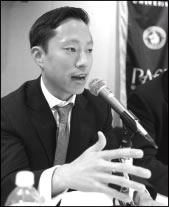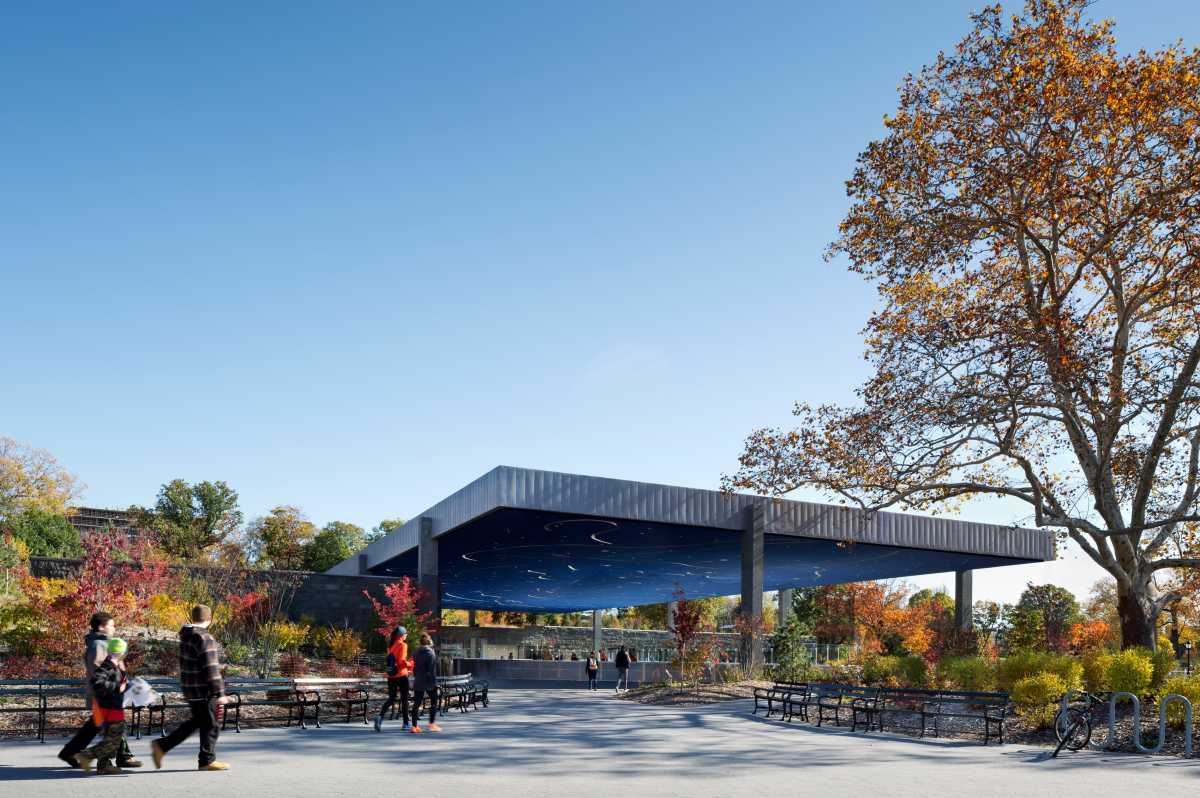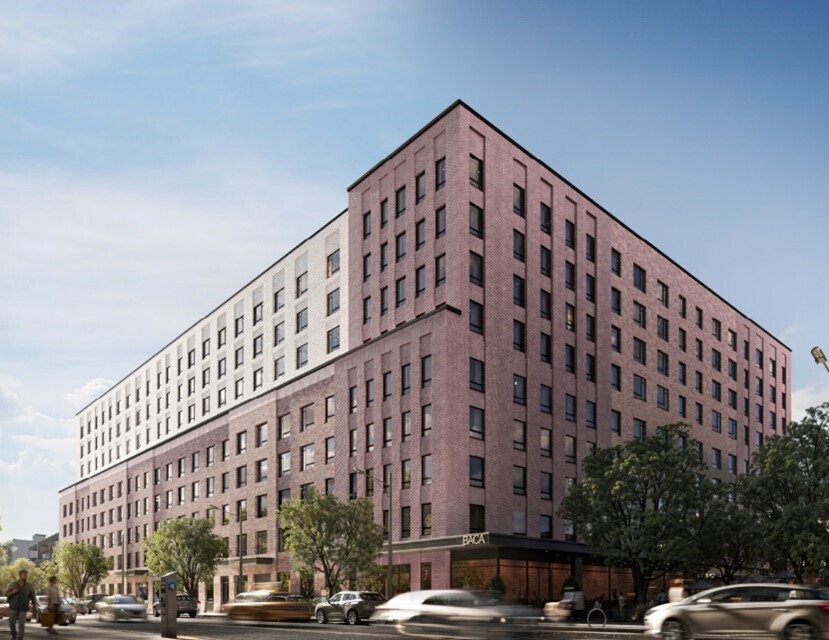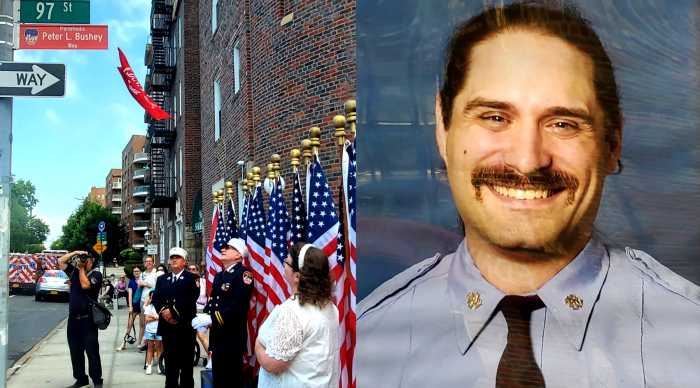By Julie Shapiro
If PJ Kim wanted to do what was best for his political career, he would not be running for City Council this year.
As a relative newcomer to Lower Manhattan’s first district — he moved here a year ago and started working Downtown two years before that — Kim acknowledged that it would make sense to grow neighborhood roots before running for office.
But he entered the race for incumbent Councilmember Alan Gerson’s seat because the rapid growth of Lower Manhattan and the deterioration of the economy have combined to create an opportunity he didn’t want to miss, Kim said in an hour-long interview with Downtown Express last week.
“We’re in an extraordinary time,” Kim said, citing classmates from Harvard Business School who are seeking food stamps.
Kim, 30, said his background in social service nonprofits is what the district needs, and his cool-headed, thoughtful approach has netted him the support of the D.C. 37 public employees union and the Citizens Union watchdog group.
But Kim’s brief history in the neighborhood and his quiet campaign style (he has not issued a single press release) have led to questions about his seriousness in the five-way race.
“This is not a test run,” Kim said last week. “I’m very serious about winning, and I wouldn’t have done this if I didn’t think I had a good chance of winning.”
Kim is running on a platform of change, promising to do more outreach than Gerson and to cool Downtown’s superheated political scene, where grudges can last for decades. However, Kim has been reluctant to criticize Gerson and did not list many specific examples of why the district needs a change. Kim did say Gerson’s disorganization is a problem, but he more often praised Gerson’s service to the district.
“I don’t have a personal beef with him,” Kim said last week. “I like him.”
If elected, Kim’s agenda includes getting an additional 1,000 school seats for Downtown, increasing transparency at the Dept. of Education, improving traffic enforcement and pedestrian safety, implementing a bus management plan and helping residents who are entitled to government benefits like food stamps and Medicaid but are not receiving them.
That last idea comes from his work at two nonprofits, Single Stop USA, where Kim ran dozens of centers that offer services to low-income families, and FoodChange, where Kim oversaw a free tax preparation program in the city.
Before joining the nonprofit sector in 2006, Kim received master’s degrees in business and public administration from Harvard University.
Kim often forgoes optimistic campaign rhetoric when he discusses the issues Downtown. On the World Trade Center rebuilding, Kim acknowledged that the City Council’s formal role is small. In the current tower-financing dispute, Kim said he was sympathetic to developer Larry Silverstein, who is seeking loan guarantees from the Port Authority. But if the Port gives more help to Silverstein to build his Church St. office towers, Kim said the Port should also receive more of the upside if the towers succeed.
In addition, Kim suggested including a school in one of Silverstein’s Church St. towers, which he said would not require a lengthy redesign because schools have been built in office towers before. Given the uncertainties about the need for office space Downtown, there should be room in the towers for a school, Kim said.
Kim does not support the Port Authority’s proposal to build shorter retail podiums along Church St. as placeholders for two of the towers, because he is skeptical that towers would eventually rise over the podiums. He cited the example of the Port Authority Bus Terminal, which was conceived as the base of a tower but has remained just a stump.
“I wouldn’t want that kind of eyesore in Lower Manhattan,” Kim said.
Kim also took a measured approach on affordable housing during his interview with Downtown Express, calling the real estate market “inexorable.” Kim said he would focus on preserving existing affordable units rather than on building new ones.
Kim wants to offer legal help to rent-protected tenants to put them on equal footing with their landlords. Particularly in Chinatown, Kim sees opportunities for tenants to band together and buy their buildings.
Most Downtown politicians have not taken a position on whether residents of Southbridge Towers, a Mitchell-Lama co-op, should leave the affordable housing program to take full ownership of their apartments. But Kim waded into the issue last week, saying, “I don’t believe it should go private.”
If elected, Kim would try to convince Southbridge residents to stay in Mitchell-Lama so the neighborhood does not lose the affordable units. If he failed, he would try to ensure that vulnerable residents, particularly seniors, are allowed to stay in their apartments, something Southbridge privatization advocates also say they would do.
While Kim is knowledgeable about many Downtown issues, he has come under fire for his lack of involvement in the district. He was removed from Community Board 1 this year after missing many meetings because his job frequently took him out of town. Even when Kim did attend meetings, he rarely spoke. He told Downtown Express in an earlier interview that he wanted to listen to what others had to say before joining in.
Kim repeated the idea last week, saying his nonprofit work taught him that the most important part about a new job is listening to the experts — in this case, longtime residents of Lower Manhattan.
Sounding as much like a professor as a political candidate, he concluded, “There’s no substitute for gathering your own fact base.”
Julie@DowntownExpress.com



































